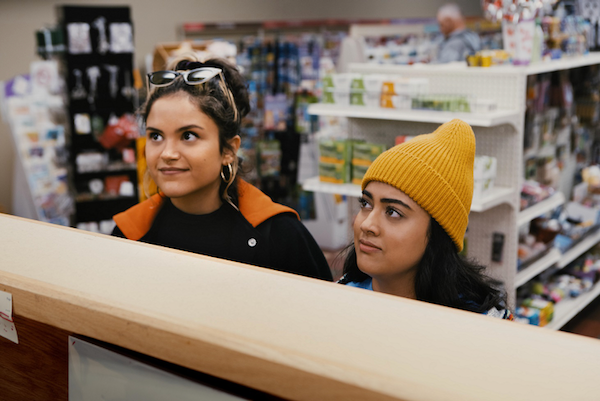Movie review by Greg Carlson
Busy performer Natalie Morales makes her solo feature directorial debut with the winning road trip teen comedy “Plan B.” Equally raucous and heartfelt, the movie follows in the footsteps of Olivia Wilde’s influential “Booksmart” by focusing on the relationship of two close high school friends. And not unlike the frequently-discussed phenomenon sometimes called “twin films,” (like “Dante’s Peak” and “Volcano” in 1997, “Capote” and “Infamous” in 2006, and “Friends with Benefits” and “No Strings Attached” in 2011, to name just a few) “Plan B” shares enough striking similarities to Rachel Lee Goldenberg’s “Unpregnant” that “Decider” and “Salon” articles have pondered the recent emergence of so-called “reproductive rights road films.”
Syracuse, New York stands in for South Dakota, but the escalating complications requiring the protagonists to get in the van are universal enough to take place in just about Anytown, U.S.A. Kuhoo Verma’s Sunny, eager for some kind of carnal experience, makes a hasty and questionable choice while hosting an impromptu house party while her real estate agent mom is out of town on business. Instead of hooking up with crush Hunter (Michael Provost) as planned, Sunny impulsively has sex with devout Christian goofball Kyle (Mason Cook). Sunny’s best pal Lupe (Victoria Moroles) — who does not know about the boy switch — supports Sunny when a condom mishap necessitates a wild goose chase after an emergency contraceptive pill.
Even while marking the checklist of outrageous teen movie tropes revolving around awkward predicaments, mind-altering substances, lies told to oneself and lies told to others, hasty escapes, embarrassing sexual encounters, and the multitude of liminal passages en route to hard-earned maturity, Morales consistently seeks out the pathos and humanity of her leads. Some of the obstacles are less convincing than others (a diversion involving a temporarily stolen vehicle strains the film’s already elastic internal logic). But Morales works several small miracles in moments that allow supporting characters to surprise us.
Screenwriters Prathiksha Srinivasan and Joshua Levy maintain a close watch on the emotional growth of the principal partners. As a result, “Plan B” is a rare bird in that it gets better as it goes along. So many movies in the teensploitation tradition start strong and quickly run out of gas. It is also true that many films in the genre turn authority figures, parents, and all other grown-ups into caricatures, but Sunny’s mother and Lupe’s father reveal nuances in the parent/child dynamic that transcend the surface gags (although the running “Indian mafia” joke is pretty solid) to at least briefly answer the age-old question, “Are parents people?”
Along with the worry and concern that nettle both Sunny and Lupe when it comes to their fears regarding possible parental reactions, “Plan B” also takes seriously the themes of bodily autonomy, female health and wellness, and the politically-driven mechanisms in place in states like South Dakota that seek to regulate and control women. Kylie Cheung cites a trio of other recent movies, including “Grandma,” “Little Woods,” and “Never Rarely Sometimes Always,” noting that “..while growth and improving representation of abortion and reproductive care in media is a victory, it’s a victory that’s hard to celebrate when the dehumanizing, real-life conditions upon which these movies are based shouldn’t exist at all.” It seems improbable that the need for stories like the one told in “Plan B” will go away anytime soon.
